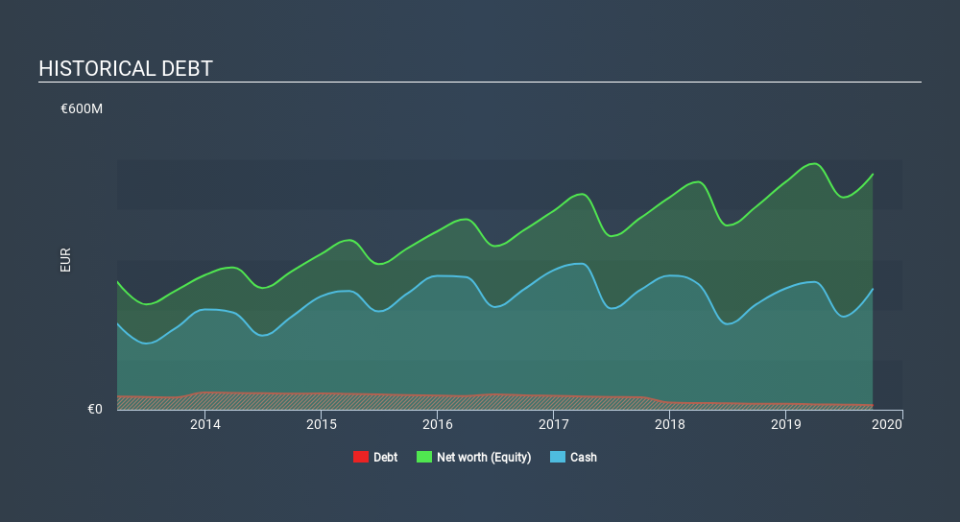RATIONAL (ETR:RAA) Has A Pretty Healthy Balance Sheet

Howard Marks put it nicely when he said that, rather than worrying about share price volatility, 'The possibility of permanent loss is the risk I worry about... and every practical investor I know worries about. So it might be obvious that you need to consider debt, when you think about how risky any given stock is, because too much debt can sink a company. Importantly, RATIONAL Aktiengesellschaft (ETR:RAA) does carry debt. But should shareholders be worried about its use of debt?
Why Does Debt Bring Risk?
Debt assists a business until the business has trouble paying it off, either with new capital or with free cash flow. In the worst case scenario, a company can go bankrupt if it cannot pay its creditors. However, a more common (but still painful) scenario is that it has to raise new equity capital at a low price, thus permanently diluting shareholders. Of course, the upside of debt is that it often represents cheap capital, especially when it replaces dilution in a company with the ability to reinvest at high rates of return. The first step when considering a company's debt levels is to consider its cash and debt together.
View our latest analysis for RATIONAL
How Much Debt Does RATIONAL Carry?
As you can see below, at the end of September 2019, RATIONAL had €9.34m of debt, up from €11.8 a year ago. Click the image for more detail. However, its balance sheet shows it holds €240.9m in cash, so it actually has €231.6m net cash.
A Look At RATIONAL's Liabilities
The latest balance sheet data shows that RATIONAL had liabilities of €144.0m due within a year, and liabilities of €37.5m falling due after that. Offsetting these obligations, it had cash of €240.9m as well as receivables valued at €126.0m due within 12 months. So it can boast €185.5m more liquid assets than total liabilities.
This short term liquidity is a sign that RATIONAL could probably pay off its debt with ease, as its balance sheet is far from stretched. Succinctly put, RATIONAL boasts net cash, so it's fair to say it does not have a heavy debt load!
The good news is that RATIONAL has increased its EBIT by 9.8% over twelve months, which should ease any concerns about debt repayment. There's no doubt that we learn most about debt from the balance sheet. But ultimately the future profitability of the business will decide if RATIONAL can strengthen its balance sheet over time. So if you want to see what the professionals think, you might find this free report on analyst profit forecasts to be interesting.
But our final consideration is also important, because a company cannot pay debt with paper profits; it needs cold hard cash. While RATIONAL has net cash on its balance sheet, it's still worth taking a look at its ability to convert earnings before interest and tax (EBIT) to free cash flow, to help us understand how quickly it is building (or eroding) that cash balance. Over the most recent three years, RATIONAL recorded free cash flow worth 56% of its EBIT, which is around normal, given free cash flow excludes interest and tax. This cold hard cash means it can reduce its debt when it wants to.
Summing up
While it is always sensible to investigate a company's debt, in this case RATIONAL has €231.6m in net cash and a decent-looking balance sheet. On top of that, it increased its EBIT by 9.8% in the last twelve months. So is RATIONAL's debt a risk? It doesn't seem so to us. Over time, share prices tend to follow earnings per share, so if you're interested in RATIONAL, you may well want to click here to check an interactive graph of its earnings per share history.
Of course, if you're the type of investor who prefers buying stocks without the burden of debt, then don't hesitate to discover our exclusive list of net cash growth stocks, today.
If you spot an error that warrants correction, please contact the editor at editorial-team@simplywallst.com. This article by Simply Wall St is general in nature. It does not constitute a recommendation to buy or sell any stock, and does not take account of your objectives, or your financial situation. Simply Wall St has no position in the stocks mentioned.
We aim to bring you long-term focused research analysis driven by fundamental data. Note that our analysis may not factor in the latest price-sensitive company announcements or qualitative material. Thank you for reading.

 Yahoo News
Yahoo News 

